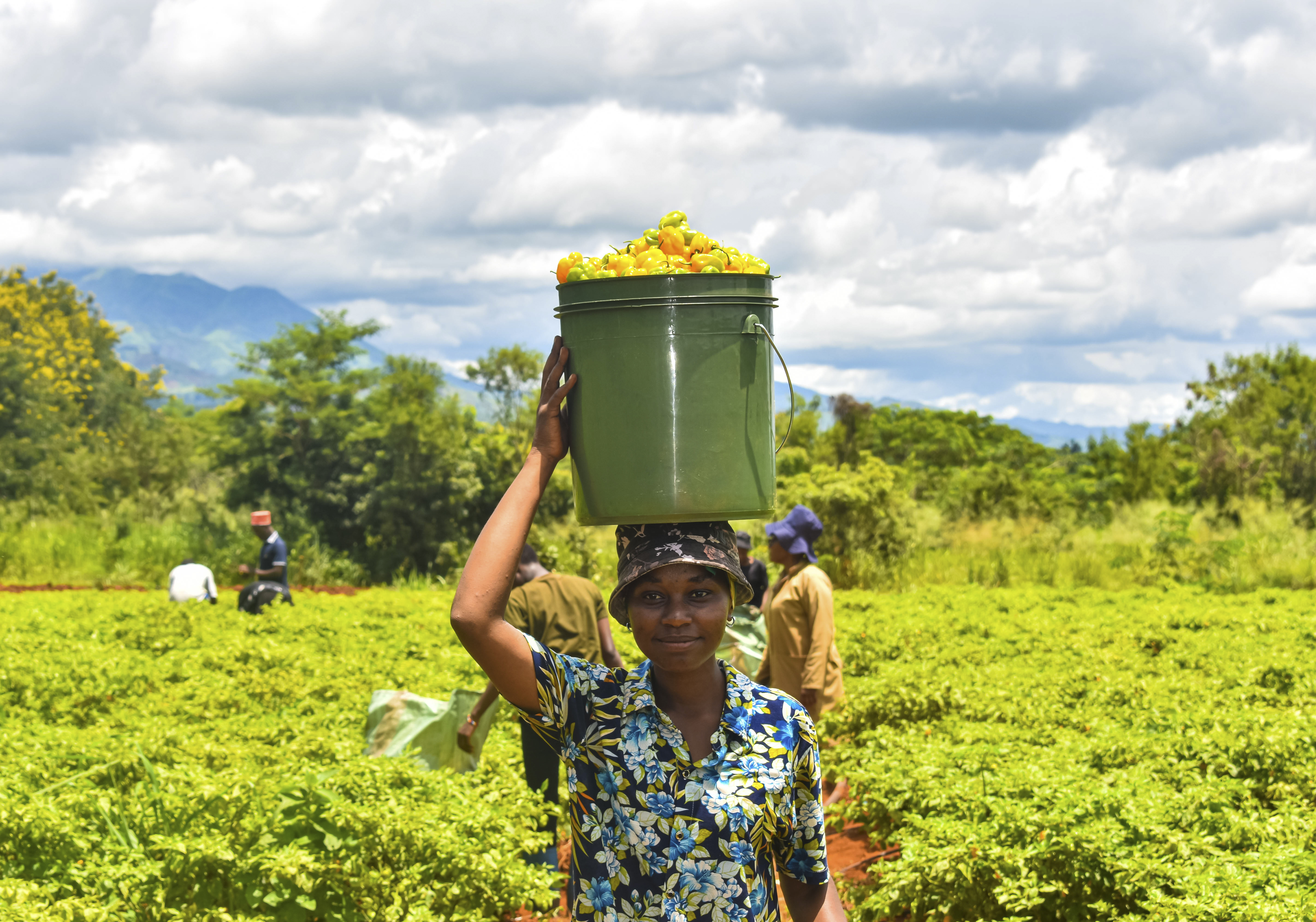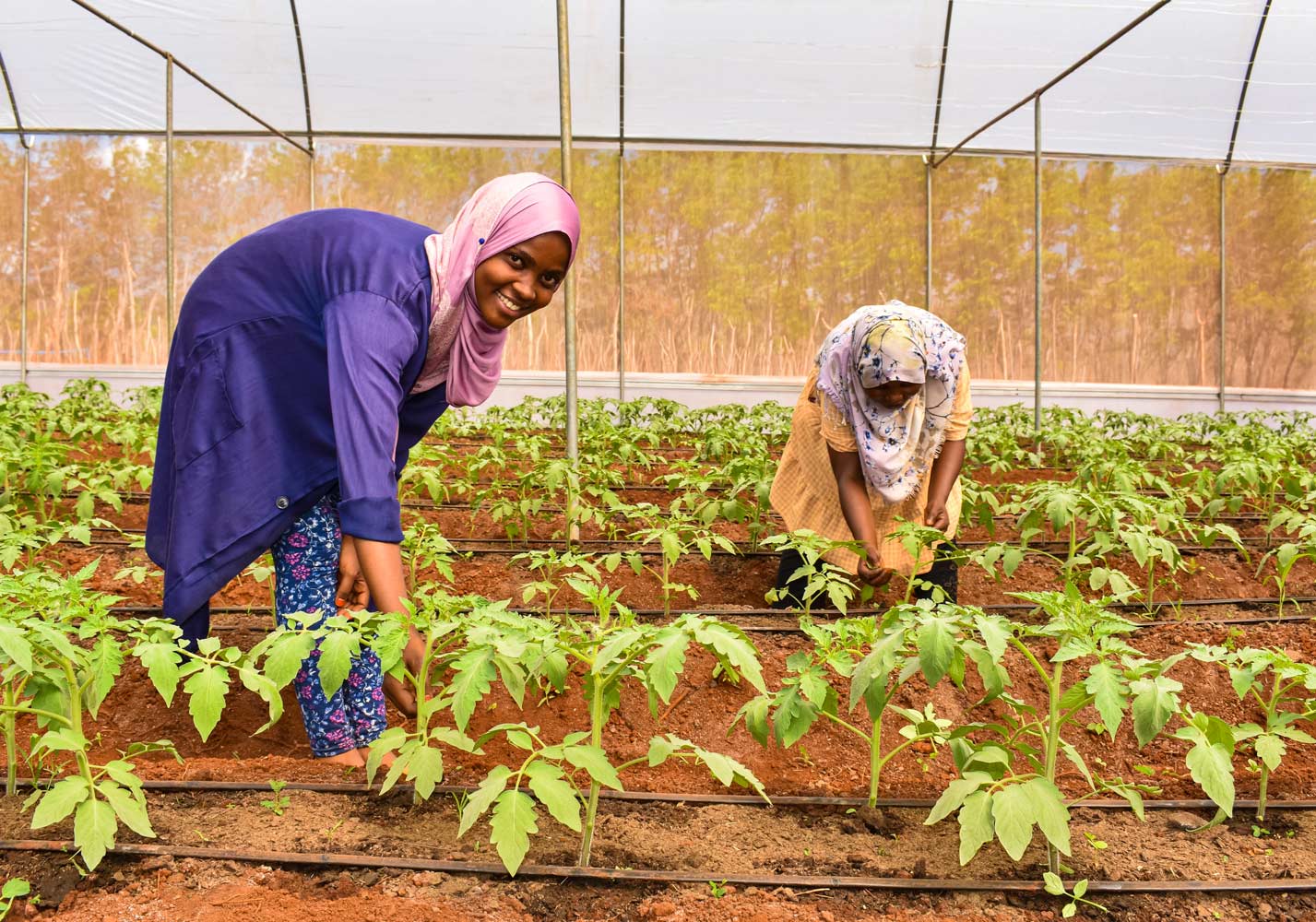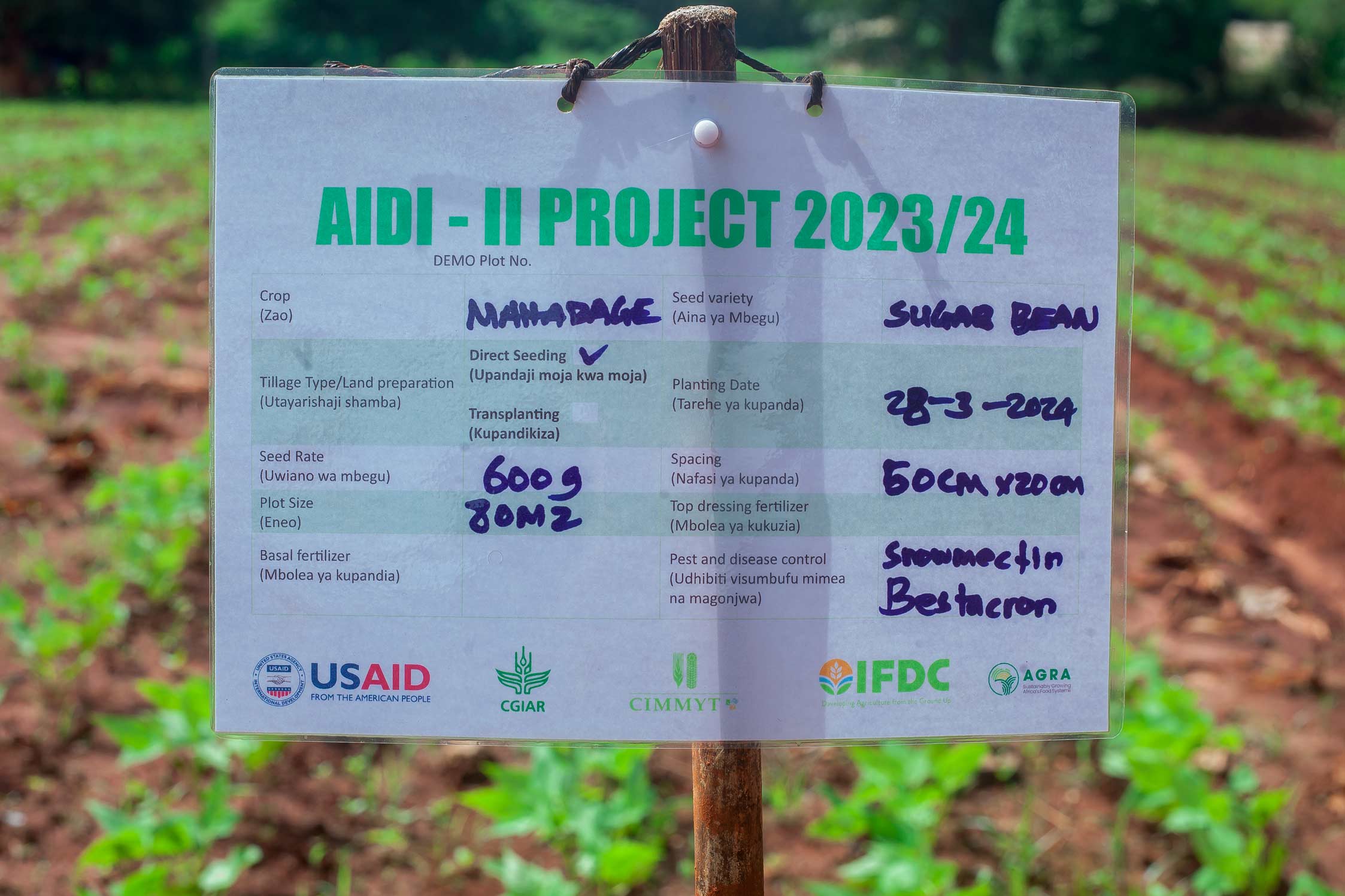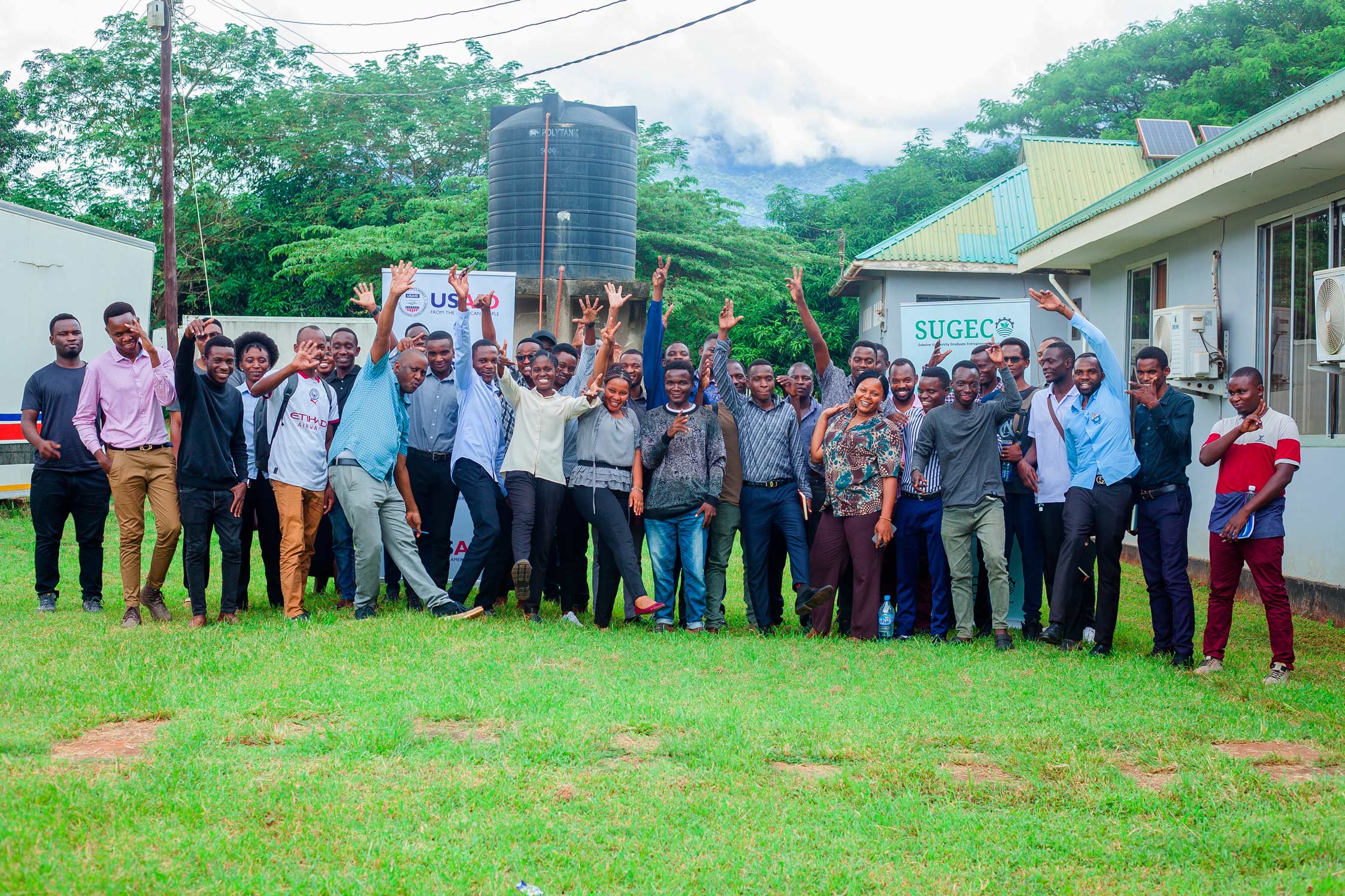SUGECO’s programs consist of training in entrepreneurship, business ecosystem and network development
Kick starting business start-up support through internships and business incubation services
Linking youth to get access to capital, land, technology, market access and expert resources
The Sokoine University Graduate Entrepreneurs Cooperative (SUGECO) is a registered cooperative established in July 2011 by a group of students and academic staff from the Department of Agricultural Economics and Agribusiness (DAEA) at the Sokoine University of Agriculture. With currently over 1000 members throughout Tanzania, SUGECO engages in various agribusiness entrepreneurial activities such as provision of training in entrepreneurship, business ecosystem, and network development, providing business incubation services and access to capital, land, and technology, and arranging start-up support through internships, among others.
The main goal of SUGECO is to make a difference in the minds of the youth, communities, and graduates from higher learning institutions in support of enterprise development for self-employment, agribusiness development, job creation, community development, and economic prosperity.


About the Project
To strengthen youth participation and empowerment in the agricultural business sector, this September SUGECO began its collaboration in the Youth Entrepreneurship for the Future of Food and Agriculture project across seven regions of Tanzania.
Together with AGRA Tanzania and the sponsorship of the MasterCard Foundation, the nearly $400,000 US project will run for 36 months until August 2027.
SUGECO's Activities in YEFFA
1. Motivate, profile, and empower close to 700,000 youth in the 7 regions of Morogoro, Iringa, Njombe, Mbeya, Songwe, Ruvuma, and Kigoma, to generate 78,473 job opportunities.
2. Reach 1,458 community members (Village Business Agents) who will be asked to profile young people in the project areas to determine their areas of interest, their situation, and what help they require to reach their goals.
3. To build leadership and operational capacity of local cooperatives.
4. Conduct 48 training programs to build capacity and adjust the mindset of youth to pursue careers, especially in the agricultural sector.
5. To run entrepreneurial events at the Regional and National levels to motivate young people to invest in agriculture.
This project will help SUGECO and its partners to form alliances with other agriculture groups in these regions. They can also use current AGRA projects and partner networks to help motivate, engage and empower youth in agri-business value chains such as sunflowers, garden crops, maize, rice, beans and soya.
Strategic stakeholders will also participate in the project including governments at the regional, district, ward, and village levels, as well as youth organizations, crop cooperatives, farmers organizations, financial Institutions, and civil society organizations.
Collecting detailed data on youth engaged in agricultural and other sector value chains is expected to provide valuable insights. This knowledge will help shape more effective programs aimed at enhancing their participation and empowering them as key contributors in the industry.
With more than 2000 members today SUGECO works to develop agricultural skills and entrepreneurship for youth self-employment through various strategies and services such as Mindset Change, Skill Development Programs, Business Development Services and Policy Dialogue that are the core of what we do.


Under the aegis of the Beyond Farming Collective program, SUGECO has been granted investment funds that will provide a major boost to its promotion of youth and female employment through commercial agriculture and a significant scaling up of SUGECO’s ground-breaking Kizimba Business Model (KBM).
Over a two-year span, SUGECO will use the investment funding provided to implement a far broader, more ambitious and financially sustainable version of Kizimba, adding new technologies and modern equipment to its agri-business operations.
The business model was designed to improve youth and women farmers’ agricultural productivity by increasing their access to farmland, extension services, agricultural inputs, technology and business knowledge. It also enables them to invest in farming with more diverse and high-value crops and assured markets to sell to.
The Beyond Farming Collective is a five-year program that began in 2022 to strengthen agri-food industry organizations (AFIOs) and drive inclusive agricultural transformation in three strategic markets in Ethiopia, Nigeria and Tanzania. The program is financially supported by the Bill and Melinda Gates Foundation.
Of the total project budget of $428,188, Beyond Farming Collective is providing the majority with a contribution of $349,528, while SUGECO’s in-kind contributions of $78,660 will include revenue from the sale of produce and service fees, as well as the use of its land, facilities, and technical expertise.
Key Targets
Employing the Kizimba Business Model it created, SUGECO will use the investment from Beyond Farming Collective to:
• Install post-harvest crates, cold room chains, harvesting equipment and packhouse facilities for sorting, grading, and processing
• Acquire four 20-foot refrigeration containers to store between 20 and 30 tons of fresh produce
• Install water reservoirs with 7.5 and 10 million liters of water storage capacity to irrigate over the dry season
• Install drip irrigation systems and a fertilization system for crop nutrition
• Purchase necessary farm machinery and equipment
• Train farmers on Good Agriculture Practice (GAP), compliance and food handling processes, agri-business skills and practical hands-on training
• Build on market links, financing, and contracting arrangements
SUGECO Objectives
The project will align with SUGECO's key objectives to:
• Raise the incomes of its members, which include young people and women farmers, ages 18 to 35
• Improve access to premium and export markets for youth and female producers that focus on high-value crops such as sweet melon, bitter gourd, Habanero chilli, and cucumbers.
• Reduce post-harvest losses by 60% through the use of improved harvesting facilities
• Increase sales volume and revenues for both SUGECO and contracted youth and female producers
• Boost employment opportunities—both direct and indirect—and generate income for SUGECO programs, its’ contracted youth, female producers, and other stakeholders in the value chain.
Key Takeaways
• 48% increase in farmer incomes
• 3,525 direct jobs
• 17,625 indirect jobs
• 21,150 direct beneficiaries
• Up to 500,000 TSH/month income
• 60 % less harvest loss
• Modern farming technologies and equipment
• Environmentally-friendly practices
• Improved Gender Equality
• Financial sustainability


Overview
Sokoine University Graduate Entrepreneurs Cooperative (SUGECO) is dedicated to facilitating youth involvement in the agricultural sector, particularly through entrepreneurship in agribusiness. This project focuses on enhancing the recovery and resilience of flood-affected communities in the Mtwara region by implementing innovative and climate-resilient agricultural practices. The project involves a multi-stakeholder approach, with an inception meeting held to engage various participants, including government officials, local farmers, youth groups, and business leaders.
Project Background
The project was initiated in response to severe floods on April 1, 2023, which devastated five villages in the Mtwara region of Tanzania—Kivava, Sokoni, Kivukuni, Angazo, and Kilamboma—displacing 1,400 people from 395 households and causing extensive damage to homes, agricultural fields, and critical infrastructure. Recognizing the urgent need for recovery and long-term resilience, UNDP Tanzania, in collaboration with the Government of Tanzania and the Mtwara Regional Authority, with financial support from the Government of Japan, developed this project to address both immediate and systemic challenges. The project is implemented by Sokoine University Graduate Entrepreneurs Cooperative (SUGECO) and focuses on enhancing the livelihoods of 300 smallholder farmers by promoting innovative, climate-resilient agricultural practices. The initiative also aims to strengthen the capacity of local authorities to integrate climate risk management into their planning and to empower women and youth-led enterprises to access green finance, thereby ensuring inclusive and sustainable recovery for the flood-affected communities.
Results to be Achieved
The project aims to achieve several key results that will significantly impact the resilience and recovery of flood-affected communities in Mtwara. Firstly, it seeks to enhance the capacity of 300 smallholder farmers to implement innovative, climate-resilient agricultural practices, ultimately leading to heightened agricultural productivity and increased production in the region. Secondly, the project endeavors to improve the capacity of Mtwara region authorities to incorporate climate-related risks, preparedness, and disaster response measures into regional plans, with a specific focus on supporting small-scale farmers. Lastly, it aims to empower women- and youth-led local Micro and Small Enterprises (MSEs) and entrepreneurs to secure green finance from the private sector, thereby fostering economic sustainability and inclusivity within the community. These results collectively contribute to building a more resilient and prosperous future for the flood-affected communities in Mtwara.
Key Activities
The project is focused to enhance inclusive recovery and resilience for flood-affected communities in Mtwara involves a series of comprehensive activities aimed at boosting agricultural productivity and sustainability. SUGECO will conduct a baseline survey to assess the current needs and introduce climate-smart agriculture (CSA) technologies and practices. Key activities include a 5-day Training of Trainers (ToT) for 10 extension officers on cassava and horticulture Good Agricultural Practices (GAP), which will be followed by step-down training for smallholder farmers. The project also involves supplying of drought-resistant seeds and appropriate pesticides to 300 farmers, along with other necessary farm inputs based on market needs and crop requirements. Additionally, soil analysis will be conducted, and technical guidance will be provided to ensure optimal soil management.
To further enhance community resilience, the project will install a water reservoir with a 7.5 million-liter capacity and drip irrigation systems covering 1 hectare of youth-owned farms. A solar water pump will be installed to facilitate water pumping for the reservoir. Community awareness training sessions on climate risk, disaster response, and sustainable post-harvest management technologies will be conducted. Enterprise mapping and market surveys will be carried out to identify opportunities for local enterprises. Furthermore, leadership, negotiation, and conflict management training will be provided, along with support for developing bankable business plans and equipping youth and women-led SMEs with skills for profitability analysis in horticulture and other value chains. These activities collectively aim to build long-term resilience and sustainability in the Mtwara region's agricultural practices and economic activities.
Expected Impact
The expected impact of the project is to significantly enhance the resilience and livelihoods of flood-affected communities in Mtwara by increasing agricultural productivity through innovative, climate-resilient practices. By training smallholder farmers, improving local authorities' disaster preparedness, and empowering women and youth-led enterprises, the project aims to address both immediate recovery needs and long-term systemic issues related to climate change and agricultural challenges. The introduction of sustainable technologies, such as drip irrigation and solar water pumps, alongside comprehensive training and support, will ensure that these communities can sustainably manage future risks, ultimately leading to improved economic stability, reduced vulnerability, and a more robust agricultural ecosystem in the region.
Conclusion
In conclusion, the project to enhance inclusive recovery and resilience for flood-affected communities in Mtwara represents a vital step towards sustainable development and prosperity in the region. Through its comprehensive approach, the project aims to address immediate recovery needs while also building long-term resilience against future challenges, particularly those posed by climate change. By empowering smallholder farmers, strengthening local authorities, and supporting women and youth-led enterprises, the project lays the foundation for a more resilient and inclusive community. Ultimately, the project's success will not only improve the livelihoods of those directly impacted by the floods but also contribute to the overall well-being and economic stability of the entire region.


This year, SUGECO, in collaboration with TAPBDs Company, is implementing the “Accelerated Innovation Delivery Initiative (AIDI-II) Project, funded by USAID through CIMMYT and AGRA. The project is implemented in Morogoro, Njombe, and Iringa Regions. The project is in response to the impacts of COVID-19 and the Russia-Ukraine war that have escalated to food security challenges in the southern part of Africa. These global crises have resulted in unprecedented impacts, including the rise in the cost of fuel, agriculture inputs (seeds, fertilizers), and food imports. The consequences are more borne by small-holder farmers.
AIDI-11's focus is on scaling food security technologies to the last mile for 1 billion households in Tanzania by 2024. The goal of the project is to scale food security technologies to the last mile for 1 million households in Tanzania by 2024.
Objectives
1. Increase sustainable production of the target crops through a market-pull approach.
2. Increase the production and utilization of high-quality seeds and fertilizer, including lime.
3. Enhance the operational and coordination capacity of the domestic seed and fertilizer markets.
4. Enhance the implementation capacity of local institutions and regional actors.
5. Enhance the resilience of small-scale farmers by enhancing their capacity to set up and disseminate agronomic and soil fertility management.
Role of SUGECO in this project
1. Capacity-building support for youth-led enterprises
2. Recruit and train VBA’s (youth and women).
3. Conduct an extension service event for farmers.
4. Facilitate VBA’s to train farmers on extension skills and the use of improved seeds and fertilizers.
5. Support the internship of youth in agribusiness through agri-SMEs and farmer organizations.
6. Support youth and women to establish QDS (for the promoted bean seed varieties).
7. Promote the adoption of various extension and land use technologies for sustainable farming.
PROJECT LINK

SUGECO, through the Feed the Future program, awarded a project entitled “Introducing Post-Harvest Loss Technologies to Unlocking the Business Potential of Horticultural Value Chains in Morogoro, Tanzania." It is a three-year project that will be implemented in Lubungo Village, Mvomero District, and Morogoro Region.
The objective of this project is to contribute to the KTA strategic objective, which aims to increase access to commercially provided and productivity-enhancing agricultural technologies. The proposed project aims to give farmers access to postharvest handling facilities for vegetable and fruit crops (sweet melon, okra, cucumber, and bitter guards, etc.) grown by youths and women in Morogoro and surrounding regions.
In this project, SUGECO will use the KBM model with contractual arrangements such as contracts with buyers in farming and the supply of the agreed value chains, contracts between SUGECO and producers on farming and the use of installed facilities, data generation, and documentation for learning and upscaling.
About Feed the Future Tanzania Kilimo Tija Project
Feed the Future Tanzania Kilimo Tija Project (hereafter referred to as the Kilimo Tija Activity or KTA) is a five-year project, worth $37.9 million that will transform the Tanzanian horticulture market system into a more vibrant, competitive, resilient, and inclusive one capable of fueling sustained growth and drawing in new market participants. Through the Kilimo Tija Project, horticulture-related enterprises, smallholders, and producer organizations—especially youth will benefit from improved commercial access to productive technologies and training to help them produce quality fresh and processed fruits and vegetables for an expanding and diverse market of domestic and international buyers.
PROJECT LINK

In January 2024, SUGECO implemented the Vocational Skills Development (VSD) project, which involved training youth aged 15–24 and young mothers. The training was centered on agri-related VSD short courses at Njiwa Juu, Njiwa Kati, and Itete villages in the Itete Ward of Malinyi District. The project was funded by Swiss Contact under the Skills for Employability (SET) project. SUGECO delivered the VSD in the form of courses, which range from medium courses of at least 2 months to long training courses of up to 6 months, depending on the respective agri-related crop cycle.
The targeted number of trainees under the implementation of this training was one hundred and twenty (120) youth who were trained in the production of orange-fleshed sweet potato (OFSP), habanero, and soybeans. This short course provided technical skills that facilitates self-employability which is supported by basic, business skills and post-training services to enhance income generation and employability results.
Through the selected value chains (OFSP, soybeans, and habanero), youth adopted modern production techniques for every value chain, as well as increasing their awareness and improving their skills in postharvest handling, value addition, and marketing of the selected value chains that will contribute to increased income.
The Beyond Farming Collective (BFC), and Gates Foundation delegation recently conducted a strategic field visit to.....
The launch of the vegetable and horticultural production project was officially inaugurated by the Honorable Adam.....
year of experience
members